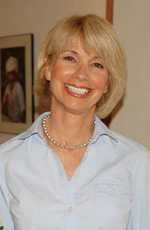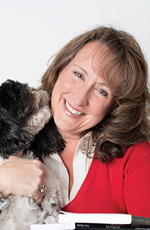 A Consultant’s Take
A Consultant’s Take
P. J. Campbell, author of the self-published novel Booked to Death: An Author’s Guide to Publishing and Murder (2015) and 101 Author Tips: Creating a Successful Book Campaign (2009), was formerly the director of events at John Wiley & Sons. She is now a publishing consultant, working with authors on marketing and speaking opportunities.
The reality is that it is incredibly difficult for authors to do everything themselves. It’s nearly impossible for someone without experience in publishing to understand the intricacies of the business. Since Miller usually publishes a book every year, he should aim to promote and publicize each one for at least three to six months. Local publicity and exposure is important, so authors should aim to get speaking events at bookstores or local organizations. Having twenty-five people at a local bookstore is considered a success. Also, remember there is positive spillover: Attendees tell other people about your book, and local bookstore managers tell national chains about successful events.
I don’t think Miller has taken advantage of all of the opportunities available to self-published authors. Among the strategies he can use to increase his sales:
• Go directly to the target audience. Look for organizations that support diversity or advocate for specific communities. They might relate to Miller’s themes and help promote the book.
• Develop a picture book. Since The Two Levels is written from a child’s perspective, a children’s book aimed at parents who want to help their kids understand the issues faced by biracial individuals could be a useful accompaniment to the novel.
• Get out and promote the book at book festivals. Many book events such as the Los Angeles Times Festival of Books and the Miami Book Fair International welcome self-published authors. These festivals would help expose Miller to a larger audience. The event organizers promote authors and, more important, media, readers, and booksellers from all over the country attend these festivals.
• Become more active on social media. Miller should research his target readership by visiting other author sites. Spending about an hour a day on Twitter and Facebook would enable him to generate some buzz. Miller should ask questions to engage readers and offer a free digital download of his book. My only caveat is that he needs to be thick-skinned; he must respond positively even if there are negative posts.
• Blogging is still relevant. Miller could blog on topics about race and identity in the news and promote the posts on Facebook and Twitter.
• Consider Amazon promotions. The retailer offers a variety of promotions for self-published authors at different price points, which could boost book sales.
Above all, Miller should keep talking about the messages in his books. There’s no substitute for establishing rapport in person or online. All authors should mention their book whenever possible, even at the gas station or grocery store. You never know who may be listening, and who might help spread the word about your book.
 A Publicist’s Perspective
A Publicist’s Perspective
Penny Sansevieri, CEO and founder of Author Marketing Experts, Inc., is an internationally recognized book-marketing and media-relations expert. Her firm has developed cutting-edge online book-marketing campaigns. She is the author of five books, including the self-published titles Red Hot Internet Publicity: An Insider’s Guide to Marketing Online (2015) and How to Sell Books by the Truckload on Amazon (2013).
While it’s true that publishing has gotten more competitive, there are also many new opportunities to promote books, especially genre fiction and e-books. When I work with authors before their books are published, I often tell them to have both print and e-books available even if they’re certain readers will primarily buy the digital edition. Print on demand (POD) allows people to affordably print a relatively small number of physical books that can be sold or sent to reviewers. Authors need print copies for many publications and to schedule promotions on Goodreads, a fan site for readers.
I’m honest when potential clients approach me. Authors who hire a publicist or marketer should expect feedback that may not be positive. On occasion, I’ve told authors that the jacket they love will make the book almost unmarketable or that the book needs another round of editing. If the author takes my advice, he or she then has to take the book down from Amazon to get a new jacket designed or have more editing done. Any criticism is not personal; I’m telling authors what they need to do to make their books commercially viable. Many of the four thousand or so books published every day are just not salable.
Having a well-written and professional-looking book still isn’t enough. Authors, especially those who aren’t yet household names, need to build and engage their fan base. Miller is on social media, which is a good start, but so far his following on each platform is pretty small; he should be more active on those platforms to help grow a dedicated readership. One way to do that on Goodreads is to post excerpts of the book. The themes of Miller’s books also make for good discussions, so he should focus on reaching out to bloggers. This outreach could garner reviews and exposure for his writing, which could also lead to speaking engagements. Several years ago I worked on Geography Club (HarperTeen, 2003), a young-adult novel about gay youth and bullying by Brent Hartinger. The author ended up speaking at many schools to promote his book. I think Miller could take a similar approach.
He should also revise the description of The Two Levels on Amazon. It needs to be stronger to attract and entice readers. Miller should reach out and ask people to post reviews on the site. I often tell authors to include a page at the back of their books specifically asking readers to post favorable reviews.
More tips for self-published authors:
• Get the book professionally edited and proofread. (Miller did hire a proofreader, but a developmental editor may have also been helpful.)
• Don’t scrimp on the cover. Unless you’re a very capable illustrator or artist, hire a book designer. Professionally designed book jackets are available for a range of prices and can make the difference between a book selling well or quickly disappearing.
• Determine your goals before hiring a publicist. Fees can range from less than a thousand dollars to twenty thousand dollars. Figure out what you hope to accomplish from a campaign. For example, while it is probably unrealistic for a new author to land a three-minute segment on a national morning news show, an author could do a satellite radio tour.
• Look at the prices of other books in your genre. Fiction e-books are particularly price-sensitive, so don’t overprice.
Debra W. Englander is a New York–based freelance editor and writer. She managed a business-book program at John Wiley & Sons for nearly seventeen years and previously worked at Money magazine and Book-of-the-Month Club. She has written about business and books for numerous publications, including USA Today, Good Housekeeping, and Publishers Weekly.








